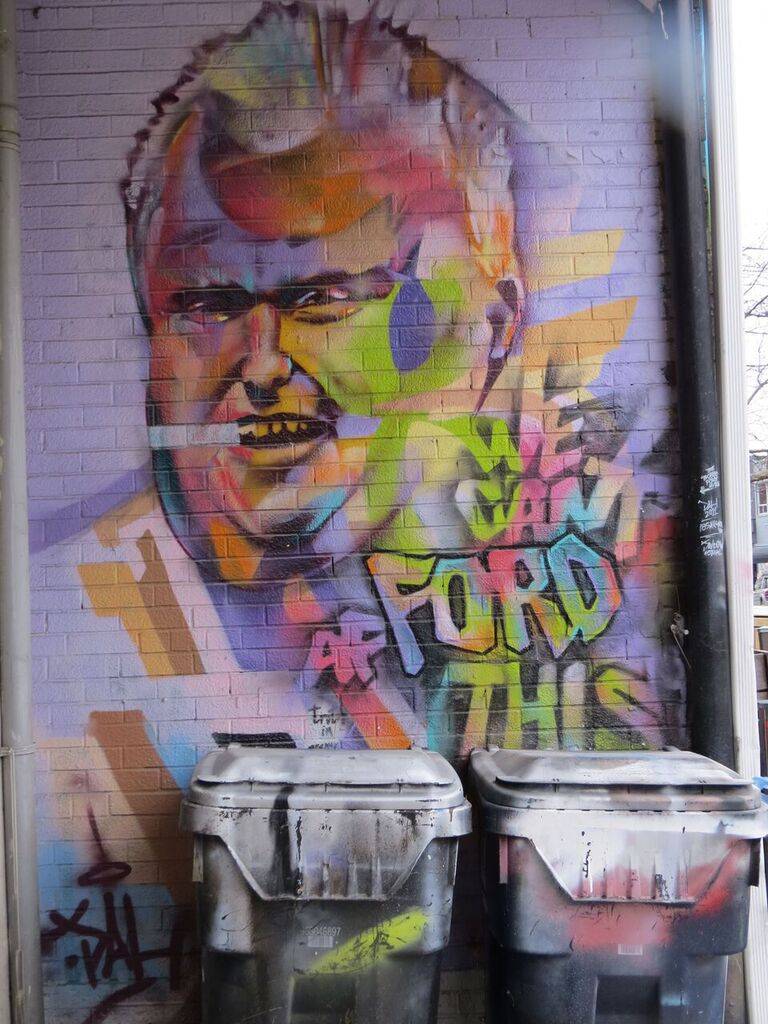Remembering Ford: A progressive’s reflection on the former mayor
On March 22, 2016 Toronto didn’t seem to know what to do with itself. With the majority of the nation’s news bureaus camped out in Ottawa awaiting the release of the federal budget, the death of Rob Ford came as a surprise. While Ford’s former critics, like Mayor John Tory, held poorly planned press conferences and struggled to identify what they will miss about the councillor, Ford Nation resurrected itself for the first time in months to sign condolence books in civic halls across Toronto. By the time the sun set on the city, the CN tower appeared to be debating between illuminating the colours of the Belgium flag, and dimming its lights in honour of the former mayor. The aerial beacon atop Trump Tower pulsed amongst the fog, as if reminding Torontonians of the now irrelevant storm brewing to the south.
I never liked Rob Ford. In my opinion, Ford was not only an alcoholic, drug addict, and domestic abuser, but the most destructive mayor this city has ever seen. His administration’s decision to end the Transit City project, for example, was arguably one of the most expensive,illogical, and misguided decisions in Toronto’s political history. Ford’s service cut backs and policy blunders also made daily life difficult for suburban and city dwellers alike. However, the passing of the political behemoth was not an emotionless event for me. Ford was the great foe who first inspired my interest in municipal politics, and like Ford’s supporters, I was deeply shocked and saddened by the news.
When Ford’s death was announced, I was at City Hall. Within minutes of the news reaching major outlets, the emotion in the usually rambunctious building turned somber. Besides the buzz from the media, now scattered around the rotunda, work grinded to a halt as city staff tuned into media coverage of the tragedy. The councillor’s campaign signs, which had hung illegally in the windows of his second-floor office, were removed and the drapes were drawn. Noticeably distraught Ford allies, like Councillor Nunziata, gave emotional interviews to the press. Some of Ford’s most iconic civilian supporters (people who had once cursed at me as I campaigned for Olivia Chow in West Scarborough) hung around C-Street reception as if expecting their hero to emerge once again. I felt sympathy for this tired bunch of Torontonians, who had put so much hope in the mayor.
Despite his flaws, Ford redefined Toronto politics, engaged a disconnected population in municipal affairs, and led his matriarchal family to the Toronto-equivalent of the Kennedys.
While he may have polarized city council, Ford reoriented the efforts of almost every city councillor towards direct customer service. Instead of the long bureaucratic chain that complaints and issues usually travel through within City Hall, Ford often responded to constituents concerns immediately. One can imagine how satisfying it would be for a disillusioned TCHC resident to have the mayor of the country’s largest city personally return a phone call or come and empty a forgotten garbage bin. It’s pretty inconceivable how any mayor could forward serious policy developments while running around the city filling pot holes, but Ford inadvertently highlighted the inadequacies of the city’s bureaucracy. From a fractioned solid waste management service to a poorly designed transit system, Toronto hasn’t really known what it’s doing in regards to city services since amalgamation. While Ford’s answer was far from a viable solution to this problem, the respect he earned for addressing it reflects Torontonians’ continuing frustration with the current system. If anything, he began a valuable discussion around service management in the city.
Additionally, Ford inspired a voting base which had long been disillusioned by municipal affairs. Angry about rising taxes with apparently few service improvements, the lower middle class which had lacked a champion throughout the Miller years, found their advocate in Ford.
Politically incorrect and angry, Toronto’s “regular guy” crack-smoking millionaire mayor attracted a new class of citizenry to civic democracy. The involvement of this new base, as unpleasant and unwelcome as it was, was indeed an expansion of democracy that will one day lead to ensuring the voices of all Torontonians are heard at City Hall.
From its matriarch Diane, to troubled sister Cathy, and enforcer Doug, the Ford family have become the center of Toronto political affairs. As if guiding Torontonians on how to best react to a municipal, federal, or even world event, a member of the Ford family was always ready to comment on almost anything throughout the Ford years. Despite only meeting Doug and Rob a few times, the amount of media coverage the family has received makes the clan feel more like close acquaintances than political enemies. As if respecting the wishes of mourning neighbours, Toronto must respect the loss of this young father, husband, and son.
Ford may have been the most destructive force Toronto has ever seen, yet there’s a sense that his death closes an era in Toronto’s history. His supporters’ dreams of his triumphant return to the mayor’s office in 2018 are now extinguished. Ford may not have found his gravy train, but he did change Toronto politics in an irreversible way.
Featured image courtesy of James Chapman
